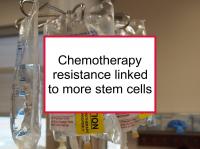A new study has reported that the proportion of breast cancer stem cells increases in cell cultures as they develop resistance to doxorubicin chemotherapy. Cancer stem cells are thought to have nearly unlimited proliferative and self-renewal capabilities and to be highly resistant to chemotherapy.
In the study, the authors tested whether prolonged continuous selection of cells for drug resistance enriches breast cancer cell cultures for cancer stem-like cells, defined as cells that could self-renew, differentiate, invade, and form tumors in mice.
The breast cancer cell lines used in the study included doxorubicin-resistant MCF-7/ADR cells, weakly tumorigenic parental MCF-7 cells, and an MCF-7 subline. Tumors were initiated in mice using grafts of cancer cells in order to examine the ability of the cells to form tumors. In addition, the expression of multidrug resistance genes was evaluated in cancer stem cells and analysis of differentially expressed genes was undertaken.
Doxorubicin-resistant MCF-7/ADR cells were found to express mRNAs from genes that are also found in breast cancer stem cells. MCF-7/ADR cells also were found to be highly invasive and readily formed tumors in mice. Unlike the weakly tumorigenic parental MCF-7 cells, more than 30% of MCF-7/ADR cells could self-renew and differentiate. In other words, they were cancer stem cell-like. These cells also overexpressed a variety of multidrug resistance-linked genes and were significantly more invasive than parental MCF-7 cells. No such enrichment in the stem-cell population was observed in MCF-7/MDR cells. The authors conclude that the cell population with cancer stem cell characteristics increased after prolonged continuous selection for doxorubicin resistance.
Please see our article on foods to eat and avoid while on doxorubicin for more information.
